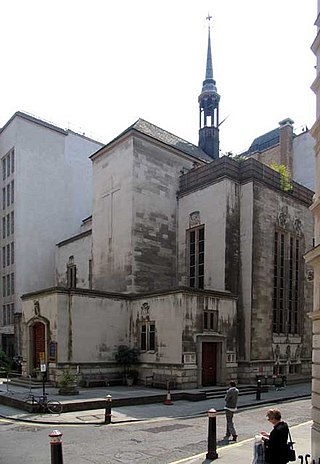Related Research Articles
William Whittingham was an English Puritan, a Marian exile, and a translator of the Geneva Bible. He was well connected to the circles around John Knox, Bullinger, and Calvin, and firmly resisted the continuance of the English liturgy during the Marian exile. At last, he was ordained by the Presbyterians in Geneva. Upon his return to England, he became a well-known opponent to the rites of the Church of England. Through the patronage of the Earl of Leicester, he was collated to the Deanery of Durham, but in 1579 action was started to deprive him of all holy orders on account of his Presbyterian ordination. The process of deprivation was in process, when Whittingham died in 1579. The full record of Whittingham's appointment and trial may be found in Strype's Annals, II.ii., pp. 167, 168, 620.

Strangers' church was a term used by English-speaking people for independent Protestant churches established in foreign lands or by foreigners in England during the Reformation.

The Marian exiles were English Protestants who fled to Continental Europe during the 1553–1558 reign of the Catholic monarchs Queen Mary I and King Philip. They settled chiefly in Protestant countries such as the Netherlands, Switzerland and Germany, and also in France, Italy and Poland.

The Congregation of Marian Fathers of the Immaculate Conception of the Most Blessed Virgin Mary is a Catholic male clerical religious congregation founded, 1670, in Poland. It is also known as Marians of the Immaculate Conception. Its members add the nominal letters M.I.C. after their names to indicate membership in the Congregation.

Anglican Marian theology is the summation of the doctrines and beliefs of Anglicanism concerning Mary, mother of Jesus. As Anglicans believe that Jesus was both human and God the Son, the second Person of the Trinity, within the Anglican Communion and Continuing Anglican movement, Mary is accorded honour as the theotokos, a Koiné Greek term that means "God-bearer" or "one who gives birth to God".
Anthony Gilby (c.1510–1585) was an English clergyman, known as a radical Puritan and translator of the Geneva Bible, the first English Bible available to the general public. He was born in Lincolnshire, and was educated at Christ's College, Cambridge, graduating in 1535.
Leonard Pilkington (1527–1599) was an English academic and clergyman. A Marian exile, he became Regius Professor of Divinity at Cambridge and Master of St John's College, Cambridge at the start of the reign of Elizabeth I. In his subsequent church career, he followed the way opened when his brother James Pilkington became Bishop of Durham.

Thomas Bickley (1518–1596) was an English churchman, a Marian exile who became Warden of Merton College, Oxford and Bishop of Chichester
Gilbert Berkeley (1501–1581) was an English churchman, a Marian exile during the reign of Bloody Mary, and then Bishop of Bath and Wells.
John Brett may refer to:
John Brett was a messenger for Mary I of England when she tried to have the Marian exiles returned to England. His chronicle survives, and gives us detailed information on this episode.
Anthony Mieres was a 16th-century influential English Protestant.
Edward Isaac was an influential 16th-century English Protestant and Marian exile. He was a lay supporter of John Bland. He resided at Well Court in Ickham and Well, Kent.
William Fyeneux was a 16th-century influential English Protestant.

The Convocation of 1563 was a significant gathering of English and Welsh clerics that consolidated the Elizabethan religious settlement, and brought the Thirty-Nine Articles close to their final form. It was, more accurately, the Convocation of 1562/3 of the province of Canterbury, beginning in January 1562.

The Marian civil war in Scotland (1568–1573) was a period of conflict which followed the abdication of Mary, Queen of Scots, and her escape from Lochleven Castle in May 1568. Those who ruled in the name of her infant son James VI fought against the supporters of the Queen, who was exiled in England. Edinburgh Castle, which was garrisoned in her name, became the focus of the conflict and surrendered only after an English intervention in May 1573. The conflict in 1570 was called an "intestine war in the bowels of this commonwealth", and the period was called soon after an "intestine war driven by questions against authority."
Arthur Saul was an English Puritan cleric and academic, a Marian exile and canon of Gloucester Cathedral.
Christina Hallowell Garrett was an academic and the main authority on the Marian exiles in 1938, English Protestant exiles during the reign of Mary I of England.

The Troubles at Frankfurt was a name given retrospectively to internal quarrels of the Marian exiles in Frankfurt am Main in the mid-1550s, involving also the Scottish reformer John Knox. Politically, Frankfurt was a Free Imperial City of the Holy Roman Empire.
References
- ↑ The Marian Exiles, Christina Hallowell Garrett, p.37